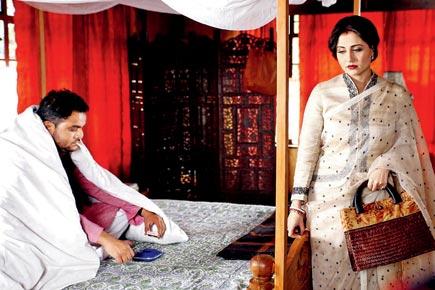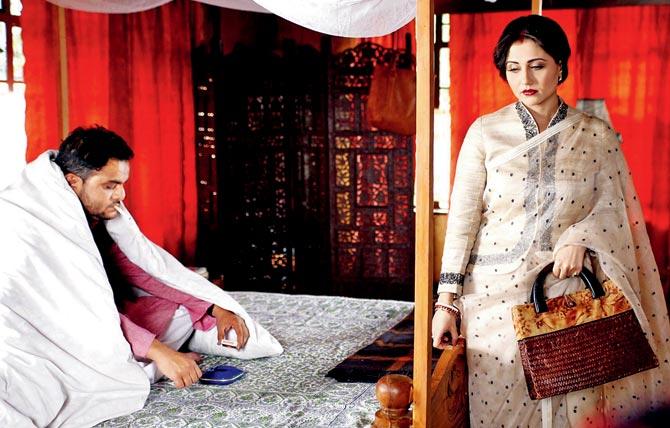I attended the Mumbai previews of two superb indie films, that were theatrically released elsewhere in India earlier - Suman Mukhopadhyay's Asamapta (Incomplete, Bengali) and Lijo Jose Pellissery's Angamaly Diaries (Malayalam)


Stills from Asamapta (Incomplete, Bengali) by Suman Mukhopadhyay
I attended the Mumbai previews of two superb indie films, that were theatrically released elsewhere in India earlier - Suman Mukhopadhyay's Asamapta (Incomplete, Bengali) and Lijo Jose Pellissery's Angamaly Diaries (Malayalam). Both very different, yet very satisfying films, that remain with you long after you've left the theatre. And yet, the Mumbai audience did not give them the warm hug they deserved. Mostly, what happens to superb, non-Hindi films in Mumbai, is that the Mallu crowd will go to see Malayalam films, the Bong crowd will go to see Bengali films — with some small surplus of film lovers who appreciate cinema in any language with English sub-titles, whether it's Malayalam or French or Farsi.
ADVERTISEMENT
If Mumbai, with its cosmopolitan culture and refined tastes, was more pro-active about word of mouth and buying tickets for great Indian (and other) films in any language, it would be deeply rewarded. Asamapta is an exquisite film from the accomplished Suman Mukhopadhyay, whose previous films include Herbert and Shesher Kabita. It would be hard to say all that one wanted to say about love in one film, but Asamapta comes close.
Based on a Sirshendu Mukherjee novel, it is a distillation of a lifetime of experiences and observations on love and relationships — the highs, the compromises, the depravity of old habits, the beauty in its pathos, the damning consequences of remaining non-committal in love, the pathetic need to be needed. With stellar performances by the cast, including Ritwick Chakraborty, Swastika Mukherjee, Paoli Dam and Bratya Basu (whose magisterial self-loathing would be hard to match), it is a film at once mature and modern, that acknowledges a married woman's sexual needs, independent of the marriage.
The other film is Angamaly Diaries directed by Lijo Jose Pellissery and produced by Vijay Babu, with a cast of 86 debutants, including Antony Varghese. It is hard to describe why one loves this film, set in the small town of Angamaly, with most of the characters being useless chaps, no-hopers, rowdies and rival gangs, and yet making us care about them. The kinetic cinematography by Gireesh Gangadharan and astounding music by Prashant Pillai hurl us right in their midst.
Both these movies gave me so much more than most of the mainstream Hindi cinema that swamps us. For such gems to find a regular audience, we need alternative distribution models. PVR, the leading multiplex company, has launched Vkaao, a theatre-on-demand service that enables film lovers to choose the films that are playing in their local theatres. But filmmakers in neighbouring countries are far ahead of the game than in India, directly reaching out to audiences.
Thai director Apichatpong Weerasethakul, who won the Palme d'Or at Cannes for his Uncle Boonmee Who Can Recall His Past Lives, put it beautifully: "We are so busy day to day, that we sometimes forget we have amassed quite a beautiful set of movies. I think it's time we unite and share these films with the world." He has started the Mosquito Films Distribution company, along with other Thai indie filmmakers, including Aditya Assarat, Pimpaka Towira, Anocha Suwichakornpong and Lee Chatametikool, for distribution and international sales of their films. Inspired by them, tiny Nepal has also beaten India to it: Popcorn Pictures Pvt. Ltd. is a Kathmandu distribution company founded by 10 young and upcoming Nepali filmmakers, to expand markets for their films locally and globally. Headed by Prachanda Man Shrestha, it has released brilliant films like Deepak Rauniyar's Seto Surya (White Sun, which won the Interfilm Award at Venice) and Min Bahadur Bham's Kalo Pothi (Black Hen, which won the Critics' Week prize at Venice).
Rauniyar said White Sun ran for two weeks on about 40 screens, remarkable in the Nepali context. Word of mouth is critical, and film critics, film clubs and influencers may like to consider actively helping "put bums on seats," as the trade squarely puts it. That's when the circle will be complete.
Meenakshi Shedde is South Asia Consultant to the Berlin Film Festival, award-winning critic, curator to festivals worldwide and journalist. Reach her at meenakshishedde@gmail.com.
 Subscribe today by clicking the link and stay updated with the latest news!" Click here!
Subscribe today by clicking the link and stay updated with the latest news!" Click here!







